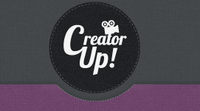Thursday, October 4, 2012
Learning The Ropes Of Internet Video With Michael Tringe and CreatorUp

You've got a great idea for a web video series, but how do you learn about how to make that happen, to get distribution, and monetize that video? Los Angeles-based CreatorUp (www.creatorup.com) wants to help aspiring online video producers with an online web education series. We spoke with Michael Tringe, one of the startup's co-founders, to learn more about what the company is getting set to launch.
What is CreatorUp all about?

Michael Tringe: We are an online web series school. We teach people how to make web series and video for the web, and specifically for sites like YouTube, and independent networks like Blip and Dailymotion. We teach through video tutorials, with courses around specific sites, like how to make content for FunnyorDie, taught by one of the staff writers from FunnyOrDie. We also talk about creating things specifically for the web, how to distribute on the web, and how to build a revenue stream aside from advertising revenue. We also have live lab sessions, which we run through Google+ Hangouts, which mirror the film school education experience.
I cofounded the company with a partner of mine, Sara Akhteh, and we went to film school together. We wanted to replicate that experience online. What the labs are, are hour long sessions to work on new projects. The teachers are people who have done really well in the digital space, and give you instant feedback. YouTube has a player which works in Google hangouts, so they can instantly screen your work or your pitch, and you can get instant feedback that way.
Those teachers are what set us apart. They've worked in this industry at a very high level. As an example, Mark Rosman, one of our directors and teachers, just got a web series picked up by Alloy, the Girls Intelligence Agency (GIA). He's been working Hollywood, too, and worked on the film "A Cinderella Story." We also have young people who have just done digital, and have done really well. An example is Melissa Rundle, who was been writing for the industry doing FunnyOrDie type comedies. She's been working almost exclusively in the digital space. In terms of what the business is, we have some free content, the first episode of each chapter. That lets you experience what we're doing, and learn something without having the full experience. We'll also be offering the top ten tips from those teachers. We want to be a resource for people to learn about this area, without having to pay, but if they want to take a tutorial or workshop, that's another option for them to do that in a more complete way.
Why is there a need for what you are offering?
Michael Tringe: It's the quality of instruction, and the connection to these higher level creators and the experience of doing it. It's a hands-on kind of education. We want to provide a menu of things that people want answered immediately, and help them to solve their next project. It's very project driven, and it's not focused on a particular skill such as how to edit. We want to provide information on how you tell a story, and how you keep people engaged. It's very content driven education, as opposed to the typical information on skills you can find on the Internet.
Who is the exact audience you're aiming this content at?
Michael Tringe: Our current audience is emerging filmmakers, film applicants, actors, writers, and bloggers, who want to learn how to make new content for the web, and who don't have all the tools and knowledge they need. The amateur is probably our target customer, but a professional also looking to transition to digital would also be pretty interested in what we are doing. They might know how to make a feature film, but when it comes to running a Facebook or Twitter social campaign, they don't know where to start.
What's your background?
Michael Tringe: I went to USC film school, and graduated with a MFA in film production. I started writing, doing production, and wrote a winning student short, and also worked at Creative Artist in film distribution and sales. I worked on packaging independent projects, and helped send Paranormal Activity to Paramount. I saw that independent film was changing underneath us, and then I moved to work for Vuguru to do creative development for a year with Kristin Jones. That's Michael Eisner's company, and Larry Tanz is president. We developed films for half a million to a million for distribution to places like Hulu and Snagfilms, and Yahoo, that sort of things. I also worked with content partnership with Blip Networks.
Speaking of digital entertainment, where do you think we are now in terms of making that model work?
Michael Tringe: I think we're at a transitional point, and a really good one. If you're talking about monetizing through advertising revenue, that's not going to change, and YouTube might pay you $1 for every thousand view, and maybe Blip might pay you $2, $3, $4, or maybe $5 for every thousand views. Digital and traditional haven't changed that much. But, we teach people to do it in a smarter way, looking at ancillary revenue, such as merchandise, and ways to build a brand or business around that content. We think it's a very promising time for independent producers to make a living on the content they are producing.
When are you launching, and what should we expect when you launch?
Michael Tringe: We're launching in the next month, and we'll have approximately twenty courses on the site to start. They will be video tutorials, and four will be live soon, and we'll build that up weekly. We'll also be doing live, promotional labs with teachers, to help people get hands on project help. We want to scale up from our first users over the course of the next year, to become a really major player in the independent producer space. You've seen Maker Studios, Bigframe, and Machinima--CreatorUp would like to become a network that's representing lots of the independent producers we've cultivated from the ground up.
Thanks!